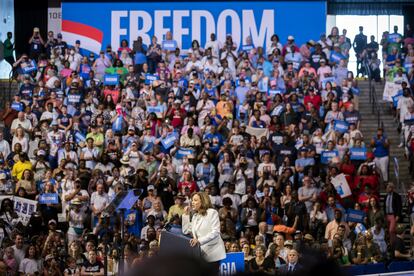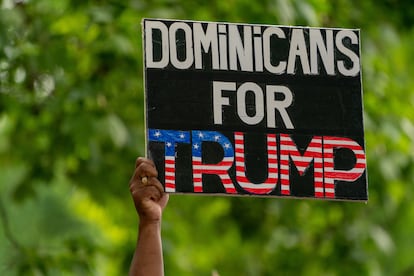Parties fail to reach out to Latinos in the campaign homestretch of the US election
Unidos US confirms Harris leads Trump by 27 points heading into November 5. However, 55% have not been contacted by Democrats or Republicans to register to vote


Kamala Harris is consolidating her lead over Donald Trump among Latinos, a key sector of the electorate made up of 36 million people who are eligible to vote. With two months to go before the presidential election, the Democratic candidate has a 27-point lead over her Republican rival among Hispanics (58.5% versus 32.4%), according to a pre-election poll sponsored by Unidos US, one of the largest Latino organizations in the United States. However, the majority of Latinos have not been contacted by either of the two major parties in the final stretch of the campaign. For 37% of the community, November 5 will only be their first or second time participating in an election.
The survey reflects the demographic explosion of Latinos, who have added four million people to the voting registry since 2020. “It’s a surprising number: 37% of Latinos in the electorate are new since the days when Donald Trump and Hillary Clinton faced off in 2016. It’s a fundamentally different group,” said Gary Segura, founder of BSP Research. The company conducted the survey in August with a sample of 3,000 Hispanics in the key territories of Georgia, North Carolina, Arizona, Pennsylvania, Nevada, Florida, Texas and California.
The poll indicates that Harris is ahead of Trump in the swing states that will define the election. The former president improved his popularity among Latinos in 2020, but the most recent voting intention figures put him below the 38% he registered four years ago. Harris is also marginally below (0.5%) the Latino vote that Joe Biden obtained. 47% of those surveyed believe that the Republican Party does not care about Latinos and 26% perceive that the organization is openly hostile towards Hispanics, compared to 7% who feel the same about Democrats.

Nearly a third of potential voters, or 28%, do not trust the parties to fight for them on the issues that concern them the most. These include inflation and rising gas prices, housing costs, access to health care and better-paying jobs. Another recent Reuters/Ipsos poll confirms that the Democratic candidate leads Trump on proposals to address these problems, although the margin is only 13 points.
Gary Segura points out that economic concerns come before immigration issues among Hispanics, even in conservative strongholds like Florida or Texas. Illegal immigration has been pushed to the fifth spot on the list of priorities. “There is virtually no support for mass deportations, an issue that has been talked about in the current political climate,” the analyst said. Instead, respondents favor a path to citizenship long-residing undocumented immigrants and for the 3.6 million Dreamers who are waiting for a solution to their legal status after a wait of more than 20 years. The majority, by a margin of 50%, also oppose making it illegal or taking that decision away from others, no matter their own personal beliefs on the issue.
Warning sign
“Once again, Latinos are sending a warning signal to both parties. Although Republicans have regained some of the support they had lost among Latinos, it is also clear that the party’s priorities and policies are far out of line with the concerns and positions of the majority of the community,” Janet Murgía, president of Unidos US, told a group of journalists. The organization has helped one million people register to vote in 20 years.
Sixty-four percent of people contacted by the BSP in telephone and online surveys said they will vote in the election, either in person or by mail. Another 15% said they are still thinking about it. Even with November 5 fast approaching and a handful of territories still in contention, analysts say most potential voters have not been contacted by either of the two major parties to register to vote.
“We often hear language that is dismissive of Latino participation, that they don’t vote as much as they should, that they can disappoint you when you are counting on them, but no one addresses the elephant in the room: no one is asking Latinos to go out and vote. Fifty-five percent of Latinos have not been contacted in the homestretch of the campaign,” says Segura. In Florida, a Republican stronghold, the figure is as high as 60%.
Nevada, the most motivated
Contact from the parties seems to be vital in an election that promises to be this close. This is clear with the case of Nevada, one of the seven states that will decide the election. Potential Hispanic voters have been contacted twice in the last three weeks. 72% of Latinos in the state say they will participate in the election. Enthusiasm is much lower in North Carolina and Georgia, where only 58% and 56%, respectively, have shown interest. 20% of Hispanics in Georgia say they will not vote even though this will be the first or second presidential election for 40% of the electorate.
Keeping a first-time voter energized is key for both parties. The outcome will not only be seen in the presidential election, but in the composition of the new Congress, which will be decisive for whoever occupies the White House from January 2025. Democrats have a 26-point lead over Republicans in the districts that are up for grabs in the House of Representatives, according to the survey published by Unidos US. However, the balance could tip in either direction because 20% are still considering which representative they will vote for.
Polls conducted by Unidos US also place the Democratic Senate candidates among the community’s favorites. The race between Ted Cruz and George Allred in Texas is particularly striking. Cruz, one of the most controversial Republicans in the Upper House, has 31% of voting intention among Latinos, while his Democratic rival has 51%, and there is still 18% who have not decided. The state race, however, is close when white voters are added. In Arizona, the Democrat Rubén Gallego leads 55% against 25% for the pro-Trump Kari Lake. Republican Senator Rick Scott of Florida is also lagging behind among Latino voters. The BSP forecast gives him a voting intention of 37% compared to 41% for his rival, Debbie Mucarsel-Powell. In this race, however, there are 22% undecided voters.
Sign up for our weekly newsletter to get more English-language news coverage from EL PAÍS USA Edition
Tu suscripción se está usando en otro dispositivo
¿Quieres añadir otro usuario a tu suscripción?
Si continúas leyendo en este dispositivo, no se podrá leer en el otro.
FlechaTu suscripción se está usando en otro dispositivo y solo puedes acceder a EL PAÍS desde un dispositivo a la vez.
Si quieres compartir tu cuenta, cambia tu suscripción a la modalidad Premium, así podrás añadir otro usuario. Cada uno accederá con su propia cuenta de email, lo que os permitirá personalizar vuestra experiencia en EL PAÍS.
¿Tienes una suscripción de empresa? Accede aquí para contratar más cuentas.
En el caso de no saber quién está usando tu cuenta, te recomendamos cambiar tu contraseña aquí.
Si decides continuar compartiendo tu cuenta, este mensaje se mostrará en tu dispositivo y en el de la otra persona que está usando tu cuenta de forma indefinida, afectando a tu experiencia de lectura. Puedes consultar aquí los términos y condiciones de la suscripción digital.








































